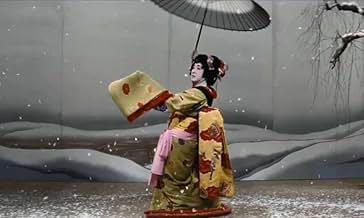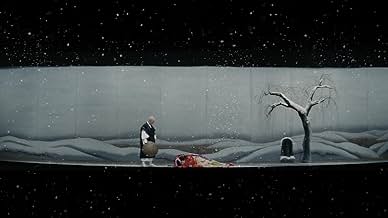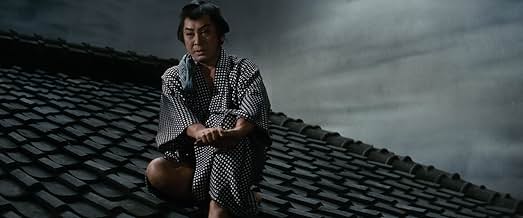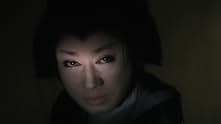IMDb RATING
7.3/10
3.1K
YOUR RATING
Yukinojo, a Kabuki actor, seeks revenge by destroying the three men who caused the deaths of his parents. Also involved are the daughter of one of Yukinojo's targets, two master thieves, and... Read allYukinojo, a Kabuki actor, seeks revenge by destroying the three men who caused the deaths of his parents. Also involved are the daughter of one of Yukinojo's targets, two master thieves, and a swordsman who himself is out to kill Yukinojo.Yukinojo, a Kabuki actor, seeks revenge by destroying the three men who caused the deaths of his parents. Also involved are the daughter of one of Yukinojo's targets, two master thieves, and a swordsman who himself is out to kill Yukinojo.
- Awards
- 1 win total
Featured reviews
This movie is that rare species - a film that doesn't take itself seriously for a moment, and yet is stunningly well made and original.
According to Donald Richies '100 Years of Japanese Cinema' the director was forced to make this movie (the remake of a popular but very hammy 1930's original) as a punishment for his self indulgence in earlier movies. He responded by turning up the campiness to '11' in Spinal Tap terms.
Kon Ichikawa manages to take the story of a famous Kabuki female impersonator who wrecks revenge on three powerful men who killed his parents both beautiful (the scenery and photography is stunning) and queasy - everyone seems to fall in love with the rather ugly and very feminine leading 'man'. The story is irrelevant (presumably deliberately so), its all an exercise in style. You can see where Suzuki and many other later directors got a lot of their ideas. Kon is a very talented and skillful film maker so despite the fact that the cast are clearly playing it up for laughs, it is extremely well made, with wonderful sets and tight editing. Despite its origins, it is genuinely entertaining and required viewing for anyone with an interest in Kabuki or Japanese design.
According to Donald Richies '100 Years of Japanese Cinema' the director was forced to make this movie (the remake of a popular but very hammy 1930's original) as a punishment for his self indulgence in earlier movies. He responded by turning up the campiness to '11' in Spinal Tap terms.
Kon Ichikawa manages to take the story of a famous Kabuki female impersonator who wrecks revenge on three powerful men who killed his parents both beautiful (the scenery and photography is stunning) and queasy - everyone seems to fall in love with the rather ugly and very feminine leading 'man'. The story is irrelevant (presumably deliberately so), its all an exercise in style. You can see where Suzuki and many other later directors got a lot of their ideas. Kon is a very talented and skillful film maker so despite the fact that the cast are clearly playing it up for laughs, it is extremely well made, with wonderful sets and tight editing. Despite its origins, it is genuinely entertaining and required viewing for anyone with an interest in Kabuki or Japanese design.
As the curtains move aside, those wanting straight-up blood and carnage, will find that "AN ACTOR'S REVENGE" goes down a different path, in what is more a patient theatrical drama of cunning revenge. And a visually striking one too. I was impressed by the audacious wide scope photography and tonal lighting of its stylistic aesthetics, which helped set up the mood and story.
Kazuo Hasegawa superbly plays a kabuki lead actor Yukinojo Nakamura, specializing as an onnagata (otherwise a female impersonator). His travelling troupe happens to be performing in the village of the three men who drove his parents to suicide when he was a child. How he goes about his revenge is like an actor playing out a part, yet he obviously takes no pleasure out of it with conflicting thoughts and hesitations. Keeping to his strengths though, he manipulates everything to his advantage using his talents and sensuality to a spin a web, and in doing so, causing unwanted grief without physical harm. He doesn't want them to die a swift death, but he wants to ruin them in the attempt to drive them mad, like they did to his parents.
The material interestingly looks at how sometimes in this quest innocence can be a casualty, and even completing this vengeance, the emotions can't fulfill that loneliness that will always linger. Sometimes that emptiness is replaced by haunting thoughts of those you destroyed to see it through. As this revenge is set in motion, there are certain unplanned obstacles, leading him to show his skill with the blade. To be honest, the few moonlight standoff scenes are quick and nothing spectacular, but it's the imagery and framing of those moments that do stand out. Director Kon Ichikawa does so much with so little. Etched with dazzling details, compact sets, thick on slow exposition and meditative characters (even jarring comic relief) in what is a classy, if distant stage play brought to life.
Kazuo Hasegawa superbly plays a kabuki lead actor Yukinojo Nakamura, specializing as an onnagata (otherwise a female impersonator). His travelling troupe happens to be performing in the village of the three men who drove his parents to suicide when he was a child. How he goes about his revenge is like an actor playing out a part, yet he obviously takes no pleasure out of it with conflicting thoughts and hesitations. Keeping to his strengths though, he manipulates everything to his advantage using his talents and sensuality to a spin a web, and in doing so, causing unwanted grief without physical harm. He doesn't want them to die a swift death, but he wants to ruin them in the attempt to drive them mad, like they did to his parents.
The material interestingly looks at how sometimes in this quest innocence can be a casualty, and even completing this vengeance, the emotions can't fulfill that loneliness that will always linger. Sometimes that emptiness is replaced by haunting thoughts of those you destroyed to see it through. As this revenge is set in motion, there are certain unplanned obstacles, leading him to show his skill with the blade. To be honest, the few moonlight standoff scenes are quick and nothing spectacular, but it's the imagery and framing of those moments that do stand out. Director Kon Ichikawa does so much with so little. Etched with dazzling details, compact sets, thick on slow exposition and meditative characters (even jarring comic relief) in what is a classy, if distant stage play brought to life.
This is an Ichikawa film so expect anything short of sheer visual awesomeness and yer a fool. Impeccably staged, superbly lighted and shot with remarkable flair for atmosphere, this one deserves a watch on its technical cinematic merits alone. The plot relates the adventures of a Kabuki stage actor plotting revenge against those who disgraced and drove his parents to madness and suicide, apparently a readaptation of a 30's movie. Everything is very campy though and the protagonist, a feminine man with a pathetic croaky voice dressed in woman's clothes, is bound to induce a fair amount of groans. Obviously related to the material at hand, Ichikawa stages and shoots the movie in a stylized theatrical manner. The intentional artificiality of sets and lighting perfectly mirrors that. Perhaps the best thing about it is the use of colour, with bright reds, yellows and whites offering a vibrant counterbalance to the almost complete darkness of other set-pieces. All in all, I didn't find the dramaturgy of the film very involving and I suspect Ichikawa didn't care for it either. From a technical standpoint however it is certainly commendable.
This movie is quite unlike any other I have ever seen. Oddly, one of the strangest things about it is the lighting. Much of the action occurs in the dark with just spotlights on the actors. This gives it a very stagy surreal feel. It takes place in historic Japan where people demonstrate their wealth not by cramming rooms with furniture, but by having gigantic carpeted empty rooms, with nothing in them but perhaps a stool. I found these starkly elegant and immensely pleasing. The exotic are things that come from Holland. It is fun looking through the Japanese side of the lens of history.
Characters often pose perfectly still for minutes an a time while some other character does something or narrates.
Yuki is a male who plays female roles in traditional Kabuki theatre. He always appears in elaborate female clothes. He is has a double chin. He is quite homely, both as male and female, but for reasons never satisfactorily explained seems irresistible to both males and females even though there are many other characters of either sex much better looking. He is also skilled at sword fighting. He is preposterously polite, effusive and self-effacing. The basic plot is seeking revenge for horrible things three men did to his parents. He subtly manipulates his enemies to do each other in.
A kabuki actor who wanders around is drag offstage does not seem to raise any eyebrows, except for people who don't realise he as an actor. Nobody seems to be the tiniest bit embarrassed by their attraction to him, perhaps annoyed or frustrated, but not ashamed.
The plot is operatic, very high emotions and drastic crazy behaviour. Kabuki theatre is definitely an acquired taste, but this movie is quite accessible and anything but boring.
There is one actor who plays two major roles. They give you a hint who it is near the end of the movie. See if you can pick it out earlier.
Characters often pose perfectly still for minutes an a time while some other character does something or narrates.
Yuki is a male who plays female roles in traditional Kabuki theatre. He always appears in elaborate female clothes. He is has a double chin. He is quite homely, both as male and female, but for reasons never satisfactorily explained seems irresistible to both males and females even though there are many other characters of either sex much better looking. He is also skilled at sword fighting. He is preposterously polite, effusive and self-effacing. The basic plot is seeking revenge for horrible things three men did to his parents. He subtly manipulates his enemies to do each other in.
A kabuki actor who wanders around is drag offstage does not seem to raise any eyebrows, except for people who don't realise he as an actor. Nobody seems to be the tiniest bit embarrassed by their attraction to him, perhaps annoyed or frustrated, but not ashamed.
The plot is operatic, very high emotions and drastic crazy behaviour. Kabuki theatre is definitely an acquired taste, but this movie is quite accessible and anything but boring.
There is one actor who plays two major roles. They give you a hint who it is near the end of the movie. See if you can pick it out earlier.
A fascinating and painterly film. It often made obvious that it was filmed in a studio. It was very influential and much admired among filmmakers when first released outside of Japan.
Previously filmed in 1935.
Two things to know to better understand the story:
1. Kabuki Actors who specialized in female roles ('onnagata' or 'ayame') used to dress as women even when off the stage. They would wear a piece of purple silk in their hair to hide the area of their scalp that they were required to shave to make them less attractive to other men.
2. Schools of martial arts, painting, etc. were run by a master ('iemoto') whose word was law. Generally each school had secret teachings that were only revealed to selected students as the master's order.
Previously filmed in 1935.
Two things to know to better understand the story:
1. Kabuki Actors who specialized in female roles ('onnagata' or 'ayame') used to dress as women even when off the stage. They would wear a piece of purple silk in their hair to hide the area of their scalp that they were required to shave to make them less attractive to other men.
2. Schools of martial arts, painting, etc. were run by a master ('iemoto') whose word was law. Generally each school had secret teachings that were only revealed to selected students as the master's order.
Did you know
- TriviaOriginally designed as a tribute to actor Kazuo Hasegawa, whose 300th film this was. The film was based Teinosuke Kinugasa's Yukinojô henge: Daiippen (1935) which also starred Hasegawa in the same dual role.
- ConnectionsVersion of Yukinojô henge: Daiippen (1935)
- How long is An Actor's Revenge?Powered by Alexa
Details
- Release date
- Country of origin
- Language
- Also known as
- Snow of Strange Change
- Production company
- See more company credits at IMDbPro
- Runtime
- 1h 55m(115 min)
- Sound mix
- Aspect ratio
- 2.35 : 1
Contribute to this page
Suggest an edit or add missing content






























